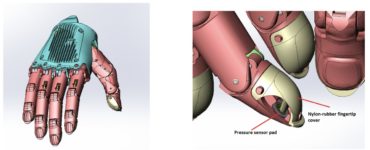ABSTRACT
This paper describes results from preliminary psychology experiments, which indicate that people (both children and adults) with autism or ASD accept realistic human-like robots, are not afraid of such robots, find such robots appealing and engaging, and may be more likely to increase social awareness as a result of interacting with such robots. These results support the further development of human-like robot technologies as possible social training tools or treatment options for ASD, and as enabling new directions in research into the nature of ASD as a social disorder.
The paper describes how the authors adapted ABA into robot delivered scripts and protocols, with focus on labeling and joint attention tasks, and tested the results using observation of behavior, input with iPad interface, questionnaires, and direct physiological measurement of bio signals including ECG and derived LF/HF ratios.
Additional research is required to validate these preliminary results, to determine if such realistic human-like robots are effective in long-term training and/or therapy. However, given the strength of the early results, and the potential value of such tools for treatment and research, such further research is warranted.
Please click here to access the PDF and read the entire paper.
David Hanson, Ph.D. Hanson Robotics
Daniele Mazzei, Ph.D. Interdepartmental Center of Research “E.Piaggio”, Faculty of Engineering Via Diotisalvi
Carolyn Garver, Ph.D. Autism Treatment Center of Dallas
Arti Ahluwalia, University of Pisa
Danilo De Rossi, University of Pisa
Kellie Reynolds, Autism Treatment Center of Dallas
Published 2012





Recent Comments